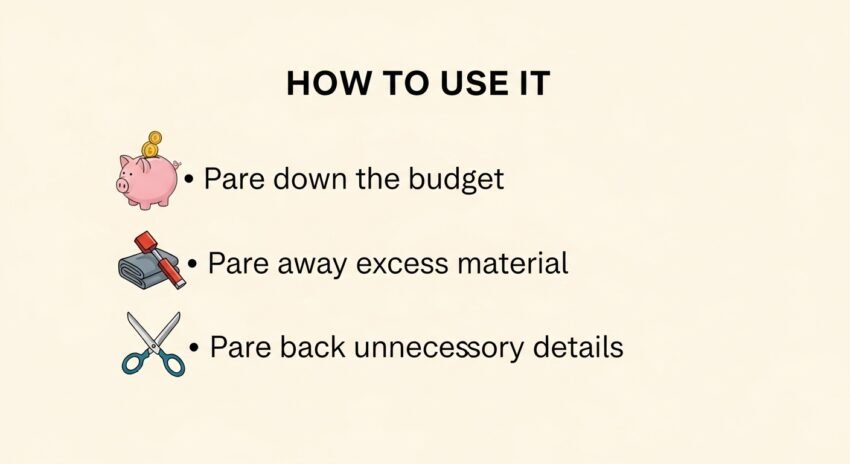Table of Contents
Have you ever come across the word “parer” and felt unsure about what it means? Don’t worry—you’re not alone! It’s not a word people use in everyday conversation very often, but it has a few interesting meanings. Whether you saw it in a recipe, heard it in a classroom, or found it in a word game, knowing the parer meaning can help make things clearer. In this article, we’re going to break it down in the simplest way possible. We’ll explain all the possible meanings of “parer,” how to use the word in writing or speech, and even what types of tools it refers to. We’ll keep it fun, friendly, and super easy to follow. By the end, you’ll be a pro at using or recognizing the word “parer” in any situation!
What Is the Basic Parer Meaning?
The word parer comes from the root word “pare,” which means to peel or trim something by cutting small parts off. So, when we say “parer,” we are usually talking about a tool or person that does that job. In most everyday situations, a parer is a small kitchen knife used to peel fruits or vegetables. That’s why you might have heard of a paring knife—a common kitchen gadget. It can also mean someone who pares something—like trimming wood, paper, or other materials. So, the basic parer meaning is someone or something that peels, trims, or removes small parts from something else.
Parer Meaning in the Kitchen
One of the most common uses of the word “parer” is in cooking. In the kitchen, a parer is short for a paring knife. A paring knife is a small, sharp knife used to cut, peel, or trim food. It’s especially useful for fruits and vegetables, like peeling apples, slicing strawberries, or removing potato eyes. Most home cooks and chefs keep a paring knife or “parer” in their kitchen tool set because it’s helpful for small, detailed cutting tasks where a big knife would be too much. So if someone says, “Pass the parer,” they probably mean the paring knife.
Parer Meaning as a Person
Did you know that “parer” can also refer to a person who pares or trims something? Just like a “runner” runs and a “teacher” teaches, a “parer” pares. For example, in a factory setting, a parer might be someone trimming rubber pieces into shape. In art or design, a parer could be someone refining the edges of paper or a model. While this version isn’t used as often as the noun for the kitchen tool, it still exists as a correct use of the word. It’s more common in older literature or certain job descriptions.
Parer vs. Paring Knife
Some people get confused between the words “parer” and “paring knife.” So let’s make it easy to remember: a parer is the short name, and paring knife is the full name of the tool. Kind of like calling “refrigerator” a “fridge.” They mean the same thing, but “parer” is the short and casual version. Both refer to a small, sharp knife used in cooking. When reading a recipe or cooking guide, just know that whether it says “parer” or “paring knife,” it wants you to use the same tool—the small knife meant for detailed food prepping.
Other Meanings of Parer in Education
In some countries, especially in Australia, you might hear the word parer used in school slang. And no, it doesn’t have anything to do with knives! In this case, parer is short for pencil parer, which means pencil sharpener. That’s right. Kids in school might say, “Can I borrow your parer?” meaning they need to sharpen their pencil. It’s just a fun, shorter way of saying a longer term. This is common in certain English-speaking countries where people naturally shorten words in casual speech. So this is another possible parer meaning you might run into.
Parer Meaning in Art and Craft

In the world of arts and crafts, the word “parer” can pop up now and then. This is especially true in activities that involve fine cutting, trimming, or shaping. For example, in model building or paper sculpture, a parer might be a special tool or knife used to carefully trim delicate parts. Artists often need precision tools to make neat edges or small details stand out, and a parer helps with that. In this setting, the parer is about control, focus, and small, careful changes. Whether it’s trimming clay, paper, or even wood, the parer plays a small but powerful role.
Parer in Language and Word Games
If you enjoy games like Scrabble or crossword puzzles, knowing the word parer can give you an edge. It’s a legal word in most dictionary-based games, and it’s worth good points in word games due to the high-value letters like P and R. You might be surprised how often short, lesser-known words like this come in handy. People searching for the parer meaning are often trying to make sense of something they read while playing a game or studying vocabulary. So yes, “parer” is a real word, and it’s a good one to remember if you’re into word challenges!
History and Origin of the Word Parer
The word “parer” has been around for quite a while. It comes from the French word “parer,” which means to equip or shield, but in English, it developed from the Old French “parier,” meaning to prepare or trim. The English verb “to pare” has been used since the 14th century. So the noun form “parer,” describing a person who pares or a tool used for paring, naturally came later. Even though we don’t hear the word often today, it still appears in cooking books, tool names, and even classic literature. Understanding the parer meaning can be a fun way to connect to words from the past.
Parer Meaning in Technology or Niche Terms
Though it’s not common, you might come across parer in technical or niche fields like woodworking, design, or automated processing systems. In some manuals or equipment guides, a parer may refer to an attachment or small trimming tool. Think of a machine that peels apples in a factory—it might include a “parer” piece inside. Sometimes, niche professions use simple old-fashioned words for tools, and parer may be one of them. If you’re in doubt, always check the context to see if parer is referring to a person, tool, or simply serving as a placeholder for something else.
How to Use “Parer” in a Sentence
Want to use the word “parer” correctly? Let’s try a few sentences to make things clear:
- “She grabbed the parer to peel the apples for the pie.”
- “The parer carefully trimmed the wooden block to fit the mold.”
- “I lost my pencil parer—can I borrow yours?”
- “Use a parer for that task since the knife is too big.”
Stick to context-based use. If you’re talking about cooking, go with the kitchen tool. If you’re writing a story or working in a craft shop, “parer” might mean the person doing the fine trimming. Either way, using the word adds detail and variety to your vocabulary.
Common Mistakes When Understanding Parer Meaning
One common mistake people make is thinking “parer” is a misspelling of the word “paper,” especially when typing fast. Another mistake is assuming it’s a modern slang word, when in reality it’s been around for centuries. Some people get confused between “parer” and “peeler.” While both tools are used to remove skins or outer layers from fruits and vegetables, a vegetable peeler usually has a handle and blade combo, and a parer is a small knife. They do similar jobs but are built differently. Always consider the setting to figure out which meaning is correct.
Building a Better Vocabulary with Words Like Parer
Learning words like parer can help you grow your vocabulary and sound more confident when writing or speaking. It’s also fun to explore words you don’t hear every day. Whether you’re trying to improve your reading skills or just enjoy learning language for fun, looking up word meanings regularly is a great habit. The word parer teaches us how some words can have multiple meanings depending on the setting—like cooking, school, or crafts. The next time you read a new word, take time to look it up—it might surprise you just like “parer” did!
FAQs
1. What is the main parer meaning?
The main parer meaning is a small tool, often a knife, used to peel or trim fruits and vegetables, especially in the kitchen.
2. Is a parer the same as a paring knife?
Yes, in most cases “parer” is a short name for a paring knife, a small sharp knife used in food prep.
3. Can parer mean a person?
Yes, parer can also mean a person who trims or pares something, like wood, paper, or food.
4. What does parer mean in school?
In Australia and some English-speaking places, “parer” is a fun slang word for a pencil sharpener.
5. Is “parer” a word I can use in Scrabble or word games?
Yes! “Parer” is a valid word in most word games and can help you score high points.
6. Is “parer” used in jobs or career fields?
Yes, especially in cooking, art, design, or manufacturing fields where fine trimming or detail work is needed.
Final Thoughts
Now that you’ve learned about the parer meaning, chances are you’ll start spotting this handy little word more often. Whether you see it in a cooking recipe, a casual school chat, or even a game board, you’ll know exactly what it means and how to use it. Understanding words like “parer” shows how language can be simple but rich, full of hidden gems. Learning new words makes writing more fun and helps you communicate more clearly. So go ahead—share what you learned about “parer” with a friend, test your vocabulary skills, or use it the next time you peel an apple. Words like “parer” may be small, but they definitely cut deep into the heart of good language skills!
